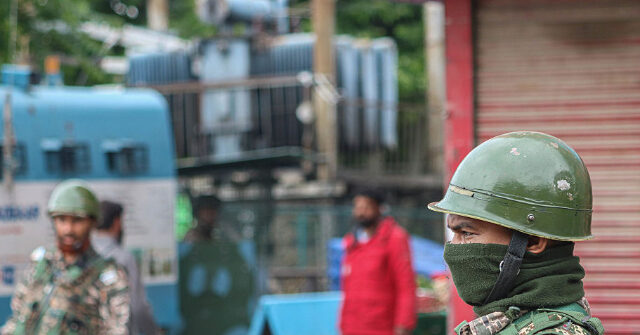Civilians living in the area described the most intense hostilities between the two nuclear-armed countries since their last war in 1999.
“We’re used to hearing exchange of fire between Pakistan and India at the Line of Control, but last night was different,” a border town resident told the Associated Press (AP).
India said its forces responded after Pakistani troops struck their positions along the LoC with artillery shells, mortars, and small-arms fire.
India also accused Pakistan of launching up to 400 drones into Indian airspace overnight, targeting three dozen military sites along India’s western borders. The Indian Air Force said many of these drones were brought down using “kinetic and non-kinetic means.”
Pakistani officials denied targeting Indian “military stations” and insisted their troops fired across the border in a “defensive response” to Indian attacks.
Pakistan also claimed India sent drone swarms into its airspace on Thursday night, and Pakistani forces were able to shoot down 48 of them.
“It is most unfortunate that India’s reckless conduct has brought the two nuclear-armed states closer to a major conflict,” Pakistani Foreign Ministry spokesman Shafqat Ali Khan said during a press briefing in Islamabad on Friday.
“India’s jingoism and war hysteria should be a source of serious concern for the world,” he said.
“The entire region is on the brink of war. We will never allow security to be compromised,” Pakistani Interior Minister Mohsin told U.S. Ambassador Natalie Baker.
India’s high commissioner to the United Kingdom, Vikram Dorisami, countered on Thursday that “the original escalation” was the April 22 slaughter of tourists in Kashmir by “Pakistan’s sponsored terror groups.”
Dorisami repeated India’s insistence that its airstrikes on Tuesday were “precise, targeted, reasonable, and moderate.”
“We made it abundantly clear that the object of this exercise was clearly to avoid military escalation — a fact that was actually acknowledged, in a left-handed way of course, by the Pakistani side in terms of their own statements, which said the airspace hadn’t been violated,” he said.
Dorisami scoffed at Pakistan’s claims to have shot down numerous high-end Indian jet fighters, but suggested India might have indulged those claims if Pakistan had considered itself satisfied with destroying some Indian planes and backed down from further conflict.
“If it satisfies Pakistan’s ego to say that they’ve done something, they could have used that as an off-ramp to move on. Clearly they’ve chosen not to, and they’ve chosen to escalate the matter,” he said.
“We’re not looking for an escalation, but if Pakistan responds, as we have done, we will respond proportionally and in exactly the same light,” he warned.
Vice President JD Vance, who visited India with his family last month, said on Thursday that the U.S. wants India and Pakistan to reduce tensions, but he noted the United States has limited influence with either country.
The U.S. has a close economic and strategic partnership with India, while Pakistan is firmly in China’s orbit, but Secretary of State Marco Rubio and other Trump administration officials have been talking to both countries since India struck alleged terrorist targets in Pakistani territory on Tuesday.
Vance stated the U.S. would not become involved if the confrontation escalates into a full-blown military conflict.
“We want this thing to de-escalate as quickly as possible. We can’t control these countries, though,” he told Fox News host Martha MacCallum.
“What we can do is try to encourage these folks to de-escalate a little bit, but we’re not going to get involved in the middle of war that’s fundamentally none of our business and has nothing to do with America’s ability to control it,” he said.
“Our hope and our expectation is that this is not going to spiral into a broader regional war or, God forbid, a nuclear conflict,” he added.
Pakistan’s ambassador to the United States, Rizwan Saeed Sheikh, told CNN on Thursday that his government has been in communication with India at the National Security Council level. He blamed India for beginning and escalating the conflict, and said de-escalation was up to New Delhi.
“This escalation, both in terms of the actions that have been taken and in terms of rhetoric that is coming out, has to stop,” Sheikh said.
“Now the responsibility for de-escalation is on India, but there are constraints on restraint. Pakistan reserves the right to respond back. There is enough pressure from our public opinion on the government to respond,” he said.
The confrontation has spread into cyberspace. On Thursday, India’s Ministry of Information and Broadcasting asked all “media streaming platforms and intermediaries operating in India” to “discontinue web series, films, songs, podcast, and other streaming media content” originating in Pakistan.
The ministry said its objective was to block Pakistani content that “threatens the unity, integrity, defense, security, or sovereignty of India.”
Breitbart News
Read the full article .


